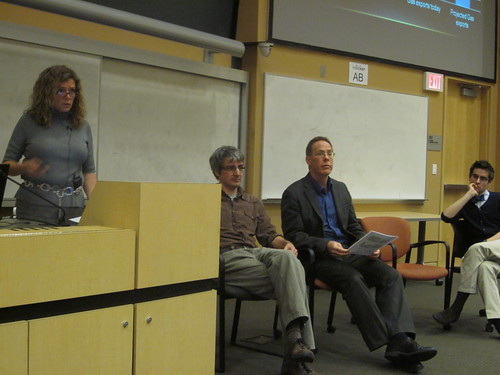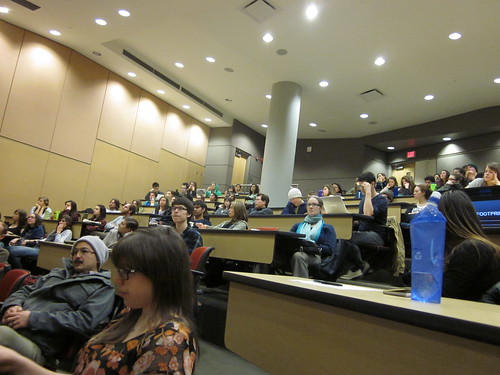While it’s quite publicly known that I don’t do scholarly research on the politics of climate change, I am a specialist in environmental politics, I’m well aware of the issues around global environmental change and my work on pollution reduction/control and water governance also has systemic implications that necessitate my awareness of research around climatic change. Global environmental issues don’t have clearly defined boundaries and thus require us to at least maintain a certain level of understanding of the issues. Thus, I made the time to attend the event “Our Canada, Our Future: Stop the Carbon Pipeline” at UBC this week.
Yesterday, I sat in to listen (and for a change, not to speak!) on a panel of colleagues of mine (Dr. Kathryn Harrison from the Department of Political Science at The University of British Columbia, Dr. Hisham Zerriffi from the Liu Institute for Global Issues at UBC, Dr. George Hoberg from the Department of Forest Resources Management at UBC), and a former student of mine, Gordon Katic (Political Science, UBC). The panel was organized by UBCC 350, and was primarily an information session where speakers presented about issues surrounding the construction of the Northern Gateway Pipeline and other plans to increase BC carbon exports. My colleagues presented some really interesting data on carbon exports, projections of carbon emissions, the need to engage in scholarly activism and my former student Gordon Katic gave a vibrant, engaging and galvanizing talk that resulted in a call to action for the event participants. Very well done, everyone.
For someone like me, who doesn’t work in the specific field of climate policy, this session was very informative and provided me some talking points that I plan to use in my teaching on global environmental politics and on Canadian environmental policy. From an outsider perspective, it looks like it was a successful event as the room was pretty packed; considering that the event took place on a Thursday evening, when it is hard to bring out anybody to events, I would applaud UBCC 350.
This session was a refreshing reminder that, even though I am a scholar, I myself have grappled with questions of whether we academics can afford NOT to be activists when we see pressing issues and the need for action. This is not an easy debate to have. I find myself increasingly frustrated with how little politicians listen to scholars like me and colleagues of mine on pressing policy issues. Much of what I do involves knowledge mobilization (and I use a variety of avenues to engage with the public, not only public lectures and speaking, but also sharing tidbits of my own research on this blog and on my social media platforms). But I share my colleagues’ frustration that behavioral change to deal with pressing climate issues isn’t coming about fast enough.
It is encouraging to see so many undergraduate students (many of my own, in fact) involved in sustainability-focused activities, such as UBCC350. I have long argued that behavioral change needs to happen earlier in life (e.g. high-school, grade school and university).
Inspired by the global climate movement fostered by 350.org, UBCC350 is a group of UBC students, faculty, and staff committed to advocating for meaningful government climate action. We strongly support aggressive global and national action to address the climate crisis, but our immediate focus is on carbon exports from British Columbia. BC has enacted progressive climate policies, but they have yet to be implemented. Recent proposals for projects that would increase BC’s carbon exports threaten to negate and even overwhelm BC’s commitments to reduce greenhouse gases. There are three main channels of carbon exports from BC: coal, tarsands pipelines, and unconventional natural gas/shale gas. UBCC350 is an independent group of students, faculty and staff and do not represent the views of the University.
Whatever your take is on climatic change, I strongly encourage you to educate yourself on the issues and to engage with the topic. The rest of my photo set from the evening is here. And should you be interested in the March 31st event (Storm The Riding), here is some information.



0 Responses
Stay in touch with the conversation, subscribe to the RSS feed for comments on this post.